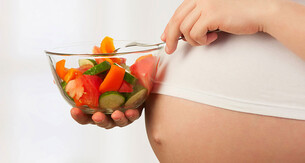Vitamin B6 is also referred to as pyridoxine, and like folic acid it belongs to the vitamin B group. It ensures an optimal uptake of vital protein from our food. Pregnant women have an increased protein requirement and thus an increased requirement of vitamin B6. In addition, vitamin B6 is involved in blood formation. As the blood volume increases by more than one litre during pregnancy, it is also vitally important for blood formation. Furthermore, vitamin B6 assumes important functions of the nervous system and supports an intact immune system.
Vitamin B6
Why is vitamin B6 so important?

Good sources of vitamin B6
Fish or meat, wholemeal products or vegetables – vitamin B6 is widely contained in foods. Beans and bananas are particularly rich in vitamin B6. Note that vitamin B6 is very delicate. It is water-soluble and exposure to ultraviolet light will destroy it. It is advisable to buy food as fresh as possible, and prepare it quickly and gently. Studies have found that vitamin B6 deficiencies mostly occur in the last trimester of pregnancy. An additional intake of vitamin B6 is therefore recommended, and can be made up with dietary supplements.
Deficiency symptoms
Severe deficiency results in dermatological and neurological problems, eye complaints and anaemia. You should not risk vitamin B6 deficiency!





